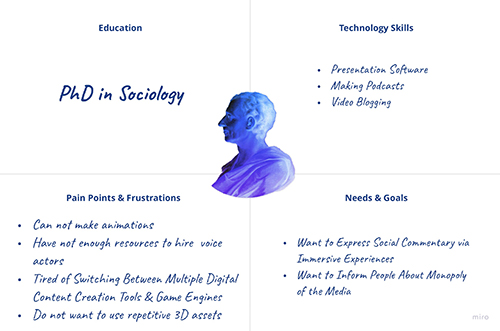Authors: Amir Reza Asadi
Posted: Thu, November 16, 2023 - 2:03:00
As we approach the metaverse, a sociotechnical future where people consume huge amounts of information in 3D formats, the significance of game development tools, including both game-engine and digital-content-creation tools, will become more and more evident. In a metaverse-oriented world, you need to create 3D experiences to express your ideas. Game engines are currently the main tools for authoring and creating AR/VR experiences; therefore, simplifying the game-authoring process is crucial for the future of freedom of expression.
Video games are the most advanced form of interactive media, conveying diverse ideas and often representing mainstream ideologies. However, making a small but sophisticated video game is an expensive form of storytelling. This issue may not be a concern for many of us because the main purpose of digital play is entertainment. But it should be a vital issue for all of us, as a metaverse-oriented world is made up of 3D game-like experiences. Those who can create more immersive experiences may take control of real-world narratives, so it’s a challenge and an important goal for us to make game development inclusive of more voices. Without simplifying the game-authoring process, our society could lose its freedom to effectively communicate and express itself, resulting in reduced empathy.
We should also not underestimate the threat of propaganda in the metaverse. The metaverse allows users to immerse themselves in dreams of virtual prosperity, and people may shelter in the virtual world to overcome the pain of poverty in the real world. Dreaming has played a vital role in the history of humanity. We dream at times when we are unhappy with our circumstances, and no dictatorship in history has been able to control our dreams [1]. With the rise of emerging non-democratic powers and economies, there is a threat that companies will start changing or censoring the ideologies of their game-alike experiences, similar to what happened to the movie industry in recent years [2,3]. In a dystopian scenario, people will trade their ability to dream for the ability to live in virtual game-alike experiences. Losing the ability to dream freely can have dangerous consequences, as it can hold people captive to mainstream ideas. But there is a silver lining. Transforming game-authoring tools in the same way that emergent video making/sharing apps such as TikTok, Snapchat, and Apple Clips have democratized video-based storytelling can give us hope that all ideas can be expressed not just freely but also effectively in the Metaverse.
A Desirable Future for Game-Creation Tools
In today’s world, game development has become simpler with free-to-use game engines, but the pipeline of game development is still complicated. We need to simplify the workflow of game-authoring tools for tomorrow. I’m not talking about a magic-wand solution here. The technologies for simplifying game authoring are available today, but we need to first let go of our previous assumptions.
The designers of game-authoring tools should create these tools based on new personas. They need to think big and assume that the intellectuals of the metaverse generation will be game authors rather than book authors. Based on this desirable future, we’ve created a persona (Figure 1) who represents a thinker, representing him with an image of Montesquieu, the famous French political philosopher. We also created a design fiction about his life:
DJ Montesquieu was a political philosopher who sought to challenge traditional modes of philosophical discourse. He saw the world through a different lens, one that viewed technology and innovation as a means of disseminating his ideas more effectively to a wider audience. DJ Montesquieu’s unique approach to philosophical discourse led him to develop his thesis not in the form of a book, but rather as a video game. His thesis was a video game that allows players to experience the impacts of overregulation from the eyes of ordinary citizens. Unlike traditional philosophers, Montesquieu was not interested in writing for the sake of writing. He was more concerned with sharing his views in a way that was accessible and engaging for people. To this end, he utilized the AlternateGameEngine, which is a combination of no-code tools and ChatGPT-based tools to create immersive AR/VR games that brought his ideas to life.
DJ Montesquieu’s games were not just entertaining; they were also thought-provoking. They allowed players to explore complex philosophical concepts in a way that was both fun and enlightening. By using technology as a medium for philosophical discourse, DJ Montesquieu was able to reach a wider audience than he ever could have with traditional writing.

Figure 1. The persona of a future political philosopher, DJ Montesquieu.
In other words, imagine a future where intellectuals and authors, instead of using word processing tools and presentation software, will be using 3D game-creation tools. Where people may quote game authors instead of Friedrich Nietzsche, and where famous people will create games instead of autobiographies. In this future, the most popular social network allows users to turn their diaries into snack-sized gaming experiences that can be experienced by others.
This future also allows society to understand situations that they cannot or do not want to comprehend by reading books. The combination of the immersive nature of the metaverse with simplified game-authoring tools will enable societies to have more ethnocultural empathy, as they can experience life from others’ point of view. Immersive 3D virtual environments have already proven effective in creating empathy among different ethnic groups [4,5], so simplifying the pipeline of immersive storytelling can create opportunities to have a more united society. Imagine that instead of watching partisan debates on TV and being exposed to online political bots, every person could share their ideas, trauma, or values via immersive experiences in the same way they can create content for social media, allowing us to live in a more empathetic community. People may not be able to express their own side of story through verbal interactions, but easy immersive-experience authoring may allow them to express their stories like livable dreams that others can experience themselves.
Endnotes
1. Rare 1997 interview with Abbas Kiarostami, conducted by Iranian film scholar Jamsheed Akrami. From Taste of Cherry Featurettes, 1997. YouTube, Mar. 1, 2021; [https: www.youtube.com="" watch?v="VTcm4P5qAF8"]
2. DeLisle, J. Foreign policy through other means: Hard power, soft power, and China’s turn to political warfare to influence the United States. Orbis 64, 2 (2020), 174–206.
3. Su, W. From visual pleasure to global imagination: Chinese youth’s reception of Hollywood films. Asian Journal of Communication 31, 6 (2021), 520–535.
4. Coffey, A.J., Kamhawi, R., Fishwick, P., and Henderson, J. The efficacy of an immersive 3D virtual versus 2D web environment in intercultural sensitivity acquisition. Educational Technology Research and Development 65 (2017), 455–479.
5. Lamendola, W. and Krysik, J. Cultivating counter space: Evoking empathy through simulated gameplay. ETC Press, 2022.
Posted in: on Thu, November 16, 2023 - 2:03:00
Amir Reza Asadi
View All Amir Reza Asadi's Posts






Post Comment
@Tiffany Gomez (2023 11 27)
Games have serious effects, and they are effective way of communicating ideas..
@Angel17 (2024 05 08)
All of us have the right to freedom of expression. boston iron works
@lisabonet (2024 06 26)
An io games education professor explains why reading is such a difficult subject to teach and learn.
@Myla (2024 07 09)
Be careful not to violate any ethical guidelines when recording audio; always let participants know if you are recording and what will happen to the data. Before the interview begins, this should be completed in the form of a consent form. See: hamilton demolition
@herringbur (2024 07 10)
When recording audio, take care not to eggy car breach any ethical norms; always inform participants that you are recording and what will happen to the material.
@metermeant (2024 07 17)
Empowering a diverse range of individuals to create, share, and experience interactive content can help foster a more inclusive and representative metaverse fireboy and watergirl.
@Jessica (2024 08 01)
I am also creating a fun game based on the Openguessr game that is both intellectual and fun!
@minoons (2024 08 16)
It was an exceptionally well-written post. It was a delight to read during my lunch break. Intend to revisit this blog more frequently. Regards, your contribution. scribble io
@Gabby (2024 08 20)
This is awesome! Thanks for the share. Superior Concrete Savannah concrete contractor
@Keira (2024 08 23)
This has given me a new perspective on the topic. Roofer
@Morsed (2024 08 28)
How about a cheap best sex dolls? You may be interested in sex dolls, and you may have already purchased one. Sex dolls are a good choice
@Reynan (2024 08 28)
Interesting post! It’s worth the long read. Fence contractor
@Pauline (2024 08 28)
I completely agree with your point of view. Thanks for the share.
Collierville Roof Pros Roofer
@Calix (2024 08 30)
Thank you for the content you’ve shared. pool screen repair
@Louise (2024 08 30)
I enjoyed reading this. Great post! pool screen repair
@games (2024 10 21)
I’m really interested in it and would like to find out more. Could you please add new things to your blog when you learn more? retro games
@Peter (2024 11 14)
It’s worth visiting this site, it is an informative article you shared. interior painters
@Evie Davis (2024 11 20)
Democratizing game authoring plays a vital role in promoting inclusive freedom of expression within the metaverse. Platforms like abcya provide accessible tools for creativity, enabling individuals of all ages to contribute their ideas and participate in shaping this digital space.
@Belle (2024 11 21)
It’s great content, thanks for sharing. Roofer
@Paul (2024 11 21)
I always look forward to seeing more informative content here. concrete contractor